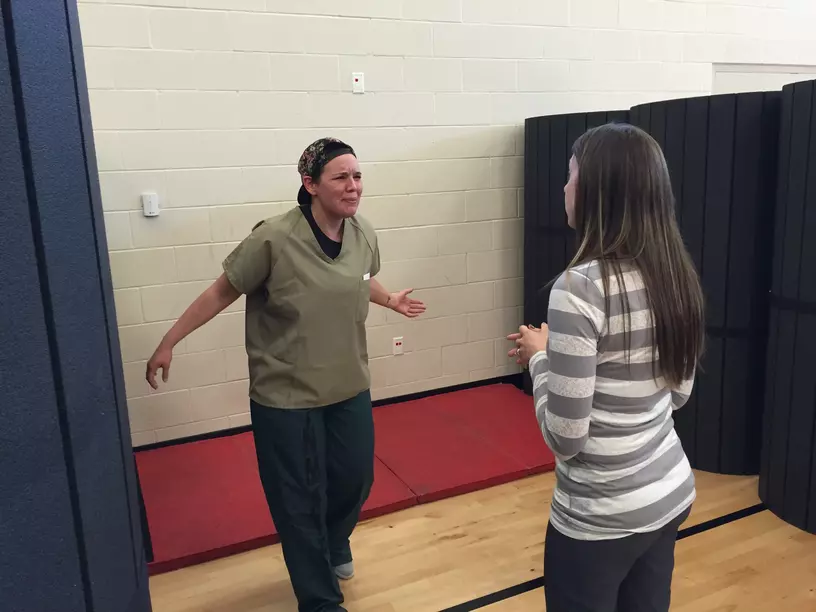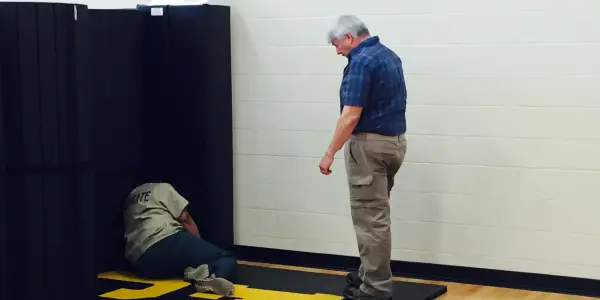Co-authored by Amanda Trump
Ask virtually any jail administrator in the country and he or she will tell you that the jail is the largest mental health facility in his or her city or county. While the Constitution only requires that jail officials act without deliberate indifference to an inmate’s serious medical needs, administrators nonetheless struggle to find creative ways to address the growing problems presented by housing inmates with mental health issues and the consequent strain on resources and efficiency.
“Sometimes I feel like I work in a mental health facility,” explained Sergeant Shannon Beaudry, first shift supervisor at the Franklin County Corrections Center II in Columbus, Ohio.
Sergeant Beaudry was part of the first group of Franklin County sheriff’s deputies who participated in Crisis Intervention Team (CIT) training specifically designed for those that work in Corrections. The training, which took place last August, was hosted by the National Institute of Corrections (NIC) and was the first-of-its-kind in Ohio. The NIC also provided the information and framework for the Franklin County Sheriff’s Office (FCSO) to establish its own CIT training. The training has proven to be invaluable in the daily work for the 24 corrections deputies who successfully completed it.
FCSO patrol deputies have participated in CIT training for years; realizing the need for training when interacting with the mentally ill on the streets in the community. The Columbus Division of Police offers the training multiple times a year and it has been beneficial for FCSO deputies and surrounding municipal agencies. However, FCSO Command Staff realized the need for specialized CIT training for Corrections deputies. Corrections deputies encounter different issues and were in need of training specifically for them. Corrections Chief Deputy Geoff Stobart explains, “Patrol officers interact with a person one time while he or she is in crisis. The officer then takes that person to either a mental health facility or to us, at the jail. We have to care for that person over and over, day in and day out until he or she is released.”
The 40 hour training is based on the NIC core components. Deputies learn mental health basics including types of disorders. They also hear from consumers, people who have suffered or currently suffer from a mental illness. Students are taught about the Probate Court warrant process, issues affecting veterans and victims of human trafficking, and will hear from a panel that includes representatives from the LGBT, Somali, and Hispanic communities. Franklin County courts offer multiple specialty dockets, including Veterans, Drug, and Mental Health Courts. Another specialty docket is CATCH (Changing Actions to Change Habits Court), which helps human trafficking victims who struggle with drug addiction. Deputies in CIT training learn about the goals of the specialized courts and how cases can be referred to them.
Importantly, deputies learn about de-escalation and communication techniques they can use in their daily job duties. Two full days are dedicated to scenario based training – placing deputies in situations they may encounter and work on how to deal with what issues may arise. CIT for Corrections offers scenario based training specific to a jail facility. In scenarios, actors engage in challenging behaviors to allow deputies to apply classroom training to handle the situations efficiently, safely, and with compassion.
On one Saturday morning, Sgt. Beaudry received a call from a deputy stating a male inmate was claiming to have suicidal thoughts and depression and requested to go on a safety watch. Sgt. Beaudry took the time to communicate with him and asked him questions to find the underlying issue. role-playingAfter he was asked about his feelings and any issues he was experiencing, the inmate admitted he had issues with others in his dorm causing him to experience depression and anger. To rectify the situation, Sgt. Beaudry suggested a change in dorm instead of the inmate having to go on a mental health safety watch, which would have caused him to be placed on suicide protocols for 48 hours. CIT gave Sgt. Beaudry the tools to assist this inmate in crisis and save time and resources of the facility.
After the first class ended, benefits from the training were felt quickly and have been invaluable . Chief Stobart explains, “This training is making a huge difference for our office.”
All over the country, there continues to be a shift in the mindset of law enforcement. Deputies are relying more on interpersonal communication skills and problem solving. Now, instead of giving orders to inmates, deputies are talking to them. CIT trained deputies make follow up visits with inmates to make attempts or continue communication. During the visits, CIT deputies are checking in on inmates and ensuring he or she is adjusting, answering any questions, and explaining available resources. With established boundaries, deputies are able to communicate on the inmate’s level and show concern for his or her well-being.
Deputies understand through CIT training the difference between when an inmate is being combative and when an inmate is acting out because something else is causing him or her to act out. Deputies are less likely to need to use force for compliance. FCSO Sergeant Mandie Rennie describes, “Because of this training, we now have communication lines available to us to gain the trust of the inmates and we, as deputies, have gained more confidence and patience when doing our jobs.”
Awareness is key to early intervention and ensuring inmates receive mental health care while in FCSO’s facilities and potentially linked to services post-release. For the first time, deputies are learning about community resources, treatment services, and county and municipal court systems. Deputies are armed with pertinent information to give to inmates while they are in crisis. They also understand the lexicon to better connect inmates with services from outside agencies. “We can better recognize when an inmate may be a client of a mental health care provider before they came into our facility and we can ensure they are linked with their case worker so they continue receiving the care they need,” Sergeant Beaudry states.
In collaboration with the Ohio chapter of the National Alliance on Mental Illness and the Alcohol, Drug, and Mental Health Board of Franklin County, FCSO is planning on two more CIT classes in 2016 to increase the number of CIT officers in Corrections to a total of 72. “It is not often in government that everyone can benefit. CIT is truly a win-win: deputies, inmates and the community all benefit,” explains Chief Stobart.
In collaboration with the Ohio chapter of the National Alliance on Mental Illness and the Alcohol, Drug, and Mental Health Board of Franklin County, FCSO is planning on two more CIT classes in 2016 to increase the number of CIT officers in Corrections to a total of 72. “It is not often in government that everyone can benefit. CIT is truly a win-win: deputies, inmates and the community all benefit,” explains Chief Stobart.
In June 2016, FCSO was recognized with the CIT Program of the Year award by the National Alliance on Mental Illness Ohio at the CIT Advanced Training Conference. While presenting the award, Director Gary Mohr of the Ohio Department of Rehabilitation and Corrections specifically mentioned Deputies Andrea Clark and Natalie Randall. Sheriff Zach Scott explains, “Dep. Clark’s communication skills and rapport building and Dep. Randall’s de-escalation techniques to help inmates in crisis are clear successes of the FCSO CIT Program.”
No established Supreme Court cases require training in CIT or the use of the techniques and skills that it addresses. CIT training, however, can be a valuable piece of a complex puzzle when discussing the issue of the mentally ill who are incarcerated and how best to respond to their needs while simultaneously ensuring and furthering the operational imperatives of the jail. Beyond the ability to communicate with mentally ill inmates, long term solutions are necessary to ensure they do not recidivate.








